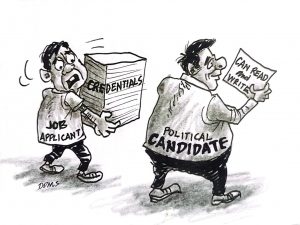It’s a disturbing reality that getting a decent job often requires a litany of credentials: a college degree, professional licenses, years of experience, and multiple clearances. Yet, to run for political office, including the presidency, the Constitution only demands that one can read and write. Why do we impose such rigorous standards on ordinary citizens seeking employment while allowing the nation’s highest positions to be filled by individuals with little more than basic literacy?
The unfairness of this system is glaring. Millions of Filipinos spend years in school, struggle through competitive exams, and chase various certificates to prove they’re qualified for work. Even after that, many remain unemployed or underemployed. The demand for qualifications is relentless. However, when it comes to those tasked with making laws and guiding national policies, the standards are absurdly low. How can we expect genuine leadership and competence in governance when the minimum requirement is barely above what a first-grader possesses?
This imbalance also paves the way for corruption. With such a low bar for candidacy, it becomes easier for wealthy and influential individuals to buy their way into office. Instead of earning votes based on their competence or vision for the country, they rely on vote-buying, patronage, and name recall. These practices perpetuate a political culture where the unqualified thrive, while the people suffer the consequences of inept governance. What does it say about our democracy when anyone with enough money and connections can climb the political ladder, no matter how lacking in ability or integrity?
Moreover, this disparity between the requirements for employment and political office sends a disheartening message to the youth. We tell them that education is the key to success, yet they see politicians in power who lack even basic qualifications, some of whom may not even understand the laws they are supposed to uphold. This contradiction undermines the value of education and hard work, which are cornerstones of a functioning society. How can we expect the next generation to respect the rule of law and public service when our leaders often treat these things as mere stepping stones for personal gain?
It’s time we reconsider the qualifications for political office. Raising the bar for those seeking public positions is not an attack on democracy but a defense of it. A minimum level of education or relevant experience should be required for leadership roles, especially those involving the management of national affairs. This is not about elitism—it’s about competence, integrity, and the future of the country. If we demand so much from ordinary workers, why not demand the same, if not more, from those who shape the nation’s destiny?




